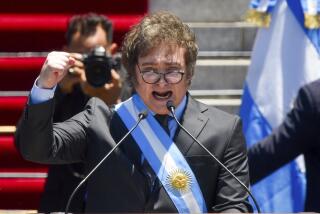The Two Mr. Castros : Visiting Leader Preaches Business and Revolution
- Share via
NEW YORK — Two Fidel Castros came here this week for the United Nations’ 50th anniversary celebration: the familiar firebrand in military fatigues who preaches revolution and a newer model in a dark suit who can talk as if he had a degree from the Harvard Business School.
Castro, one of the world’s last Communist leaders, has sometimes sounded like a U.S. governor soliciting corporate business for his state. He rolled out a welcome mat here to construction, agricultural, pharmaceutical and textile concerns, as well as to the tourism and airline industries.
Before they can enter, though, the United States must lift the economic embargo that has strangled the Cuban economy since 1961. Castro appealed for just that during a five-hour private dinner Saturday at the Council on Foreign Relations hosted by Peggy Dulany, a daughter of banker David Rockefeller.
He bolstered his pitch, according to several of the roughly 20 business leaders who heard it, with trade and economic statistics and historical and political arguments.
And he appealed to the business executives’ self-interest. If the embargo remains, he said, U.S. corporations will lose the potentially lucrative Cuban market, because foreign companies are already moving in.
Castro emphasized that he does not want to open up to development by the West too quickly, as he said Russia and China have. He reportedly spoke with sophistication about the problems those two countries are encountering as they make the transition from centrally planned economies to free-market states.
He told the group he is determined to avoid those pitfalls and to protect his revolution.
Many of the business leaders who met Castro came away impressed.
“I found that he is a knowledgeable businessman,” said Dwayne O. Andreas, chairman and chief executive of Archer-Daniels-Midland Co. “He is managing one of the most important businesses in the world.
“In fact, he is managing most of the businesses that supply the 10 million people in Cuba with goods and services. He conveyed to me a good understanding of his capital requirements, his interest cost and his work to bring down the public deficit, which is now about zero.”
The corporate Castro contrasted sharply with the Castro who turned up the next night at the Abyssinian Baptist Church in Harlem in his familiar fatigues. A revolutionary again, he put on a vintage Castro performance, speaking triumphantly about Cuba’s battles to end colonialism at home and in Africa and boasting of Cuba’s rising literacy rate and improved medical care.
Although the sight of Castro in a business suit caught many New Yorkers unawares, it came as no surprise to those who have spent time with him recently.
Earlier in October, the Cuban leader met in Havana with 45 top executives of U.S. companies, colleges and foundations during a world tour sponsored by Time magazine.
“It was obvious they want to attract foreign investment . . . but I think on rigorous terms,” said Lawrence B. Buttenwieser, a New York lawyer who attended that meeting.
“He said he was wary of the influence of the multinational firms,” Buttenwieser said, “but he gave me the impression that on an appropriate basis, he would welcome their investment. Things are never a simple declarative sentence with Castro.”
Others who have met Cuba’s leader said that when he speaks with American business leaders, he can sound just like one of them.
“He talks in terms of market penetration when he discusses Cuban products,” said a source who has met with Castro recently and is familiar with his message. “You’d think he got his MBA while on leave. He plays the CEO role very well with other CEOs.”
Last month, the Cuban government approved a law increasing the role of foreign investment in the economy-creating free-trade zones and allowing foreign companies to invest in parts of the economy that previously were off limits.
European and Latin American companies have already invested in Cuba. A Mexican consortium is modernizing Cuba’s telephone system, and European hotel chains have begun to move in. Some American hotel companies see the potential for a growing tourist industry on the island, which has 2,000 miles of undeveloped shoreline.
Cuba also offers opportunities for development in metals and mining, agriculture and consumer products and services. It has 27% of the world’s reserves of nickel and cobalt and produces sugar, coffee, tobacco and citrus concentrate.
The loss of Soviet aid has created a huge, pent-up demand for basic goods and services.
More to Read
Sign up for Essential California
The most important California stories and recommendations in your inbox every morning.
You may occasionally receive promotional content from the Los Angeles Times.













